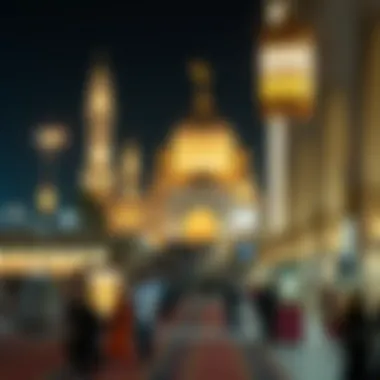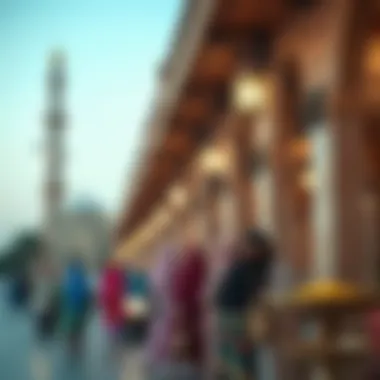Public Holidays in the UAE for 2024: Key Dates and Insights


Intro
The public holidays in the United Arab Emirates are not merely days off from work; they encapsulate the rich mosaic of cultural heritage, social values, and economic rhythms that define this remarkable region. In 2024, these holidays will serve as essential markers, not just for the residents but also for expatriates who call the UAE home. As a melting pot of cultures, understanding the significance of these dates provides insights into local traditions and helps in planning activities, family gatherings, and even investment opportunities. This guide lays out an engaging overview of important public holidays in 2024, the historical context behind them, and how they shape the lifestyle and economy of the UAE.
The calendar for public holidays reflects the Islamic calendar, leading to some variation year by year. Mark your calendars, as some dates are fixed, while others shift with the lunar cycle. Knowing these holidays is crucial for smooth operations, whether you are a business owner, an investor, or simply someone planning a vacation.
"In every society, public holidays serve as occasions for unity, cultural expression, and social cohesion".
Accompanying our exploration is a look at how these holidays influence market trends, particularly in sectors like tourism and retail. If you’re a real estate agent or an investor, understanding these patterns could reveal new opportunities amid changing landscapes. Let’s dive into the significant dates that will fill 2024 with celebrations across the Emirates.
Prolusion to UAE Public Holidays
The public holidays in the United Arab Emirates (UAE) play a significant role in shaping the cultural and social fabric of the nation. They not only mark important historical events and religious observances but also provide residents and expatriates alike a chance to engage with their community and celebrate the diverse backgrounds that flourish within the emirates. Understanding these holidays is essential for grasping the lifestyle of people living in the UAE, especially for investors and real estate agents trying to connect with this unique culture.
In the UAE, public holidays often serve as a window into the values and traditions that define the society. For instance, Islamic holidays like Eid Al Fitr and Eid Al Adha highlight the importance of community, family, and reflection, while the celebration of National Day showcases national pride and unity. Being aware of these moments allows expatriates and businesses to plan their activities around these days effectively.
Moreover, the significance of public holidays extends beyond the simple marking of dates on a calendar. It encompasses economic ramifications as well, influencing retail schedules and tourism patterns. Recognizing the framework of holidays helps businesses strategically position themselves during peak seasons while facilitating community engagement and participation.
Significance of Public Holidays
Public holidays provide a much-needed reprieve from the everyday hustle, allowing individuals to regroup and reconnect with loved ones. In a fast-paced environment like the UAE, where many expatriates work long hours, these days offer the opportunity to recharge one’s emotional and social batteries. For locals and expatriates alike, it's a time to indulge in traditions, from elaborate feasts during Ramadan to family fireworks on New Year's Eve.
Additionally, public holidays are pivotal in promoting a sense of belonging. They encourage citizens and residents to partake in various community events that bridge cultural gaps. Festivals, parades, and public gatherings foster unity and create shared memories, thereby supporting social cohesion.
Framework of Holidays in the UAE
The framework within which public holidays are structured in the UAE is a balanced blend of secular and religious occasions. Primarily, the holidays can be categorized into three groups: Islamic holidays, national holidays, and public celebrations. The dates of Islamic holidays vary annually, determined by the lunar calendar, which can sometimes lead to unexpected changes in scheduling.
Public holidays in the UAE typically include:
- Islamic Holidays: These include Eid Al Fitr and Eid Al Adha, celebrating the end of Ramadan and pilgrimage respectively.
- National Holidays: The most significant is UAE National Day, observed on December 2, honoring the federation of the emirates.
- Cultural Events: Dates like New Year’s Day and the Prophet’s Birthday also hold high regard, marking introspection and celebration respectively.
The government also evaluates and updates the list of public holidays, sometimes adding additional days based on cultural importance or special occurrences. This adaptability speaks volumes about the UAE’s commitment to catering to its diverse population’s needs.
Understanding the public holiday structure gives invaluable insight to real estate agents and investors about when to plan showings and events that align with community activities.
Overview of Public Holidays in
Public holidays in the United Arab Emirates hold significant value not only for individual celebrations but also for the collective culture. Understanding these holidays in 2024 is crucial for various reasons, from planning personal activities to strategizing business operations. The year 2024 presents an array of key dates that reflect the UAE’s rich historical and cultural tapestry. Familiarity with these occasions is essential for residents, expatriates, and investors alike, each group having unique needs and perspectives on holiday observances.
List of Public Holidays


In 2024, the public holidays in the UAE consist of several noteworthy events, both secular and religious, that resonate with the population. Here’s a closer look at the planned holidays:
- New Year's Day: January 1st, marking the start of the year with celebrations across the nation.
- Eid al-Fitr: Expected around April 10th, this festival celebrates the conclusion of Ramadan and is characterized by joyful gatherings and feasting.
- Arafah Day: Anticipated on June 15th, this day precedes Eid al-Adha, symbolizing a pivotal moment in the Islamic calendar.
- Eid al-Adha: Following Arafah, this feast is set for June 16th, recognizing the willingness of Ibrahim to sacrifice his son as an act of obedience to God.
- Islamic New Year: July 7th will see the commencement of a new lunar year.
- Prophet Muhammad's Birthday: September 15th honors the birth of the Prophet with various community events.
- UAE National Day: December 2nd is a noteworthy day that celebrates the union of the seven Emirates, culminating in cultural festivities and displays of national pride.
These holidays not only serve as time for rest but also play a pivotal role in the social and economic framework, influencing both community dynamics and commercial activities.
Observed Holidays in Different Emirates
Holidays in the UAE can vary across its seven Emirates, with each region sometimes having its peculiarities in observance. While most holidays are uniformly recognized, certain areas have additional local traditions that enrich the celebration experience. For example:
- Abu Dhabi: Often hosts grand public parades and events, particularly for National Day, featuring fireworks and cultural shows in the Corniche area.
- Dubai: Known for large scale celebrations during New Year's Eve, with fireworks at the Burj Khalifa attracting a global audience.
- Sharjah: Focuses more on cultural events during Ramadan, including markets and community Iftar gatherings.
- Ajman, Umm al-Quwain, Fujairah, and Ras Al Khaimah: While they share the main holidays, the local festivities might differ, with a stronger emphasis on family gatherings and traditional practices.
The diversity in holiday observances allows expatriates and locals alike to enjoy a broader cultural exchange, enhancing their understanding of the UAE’s rich heritage.
"Public holidays in the UAE serve not just as time off work but as portals to the cultural identity and shared experiences of its people."
As we delve deeper into the cultural and economic implications of these holidays, it becomes clear that they play a significant role in binding communities and fostering understanding among the country’s diverse population.
Cultural and Religious Context
Understanding the cultural and religious significance of public holidays in the UAE is crucial. The UAE is a melting pot of traditions and beliefs, owing to its diverse population. This context provides a glimpse into how holidays are celebrated and how they shape societal values.
Holidays are not merely days off from work; they embody the very essence of community spirit and cultural heritage. For expatriates, in particular, grasping this aspect can enhance their overall experience living in the UAE. Here, holidays reflect a blend of Islamic traditions and local norms, which gives them a unique flavor.
Islamic Holidays and Their Meaning
Islamic holidays in the UAE are rich with meaning and tradition. For example, Eid Al Fitr marks the end of Ramadan, a month of fasting and contemplation. The day begins with a special prayer at mosques, followed by feasting and giving of alms. This expresses gratitude for the blessings received and fosters community ties through shared meals and celebrations.
Similarly, Eid Al Adha commemorates the willingness of Ibrahim to sacrifice his son in obedience to God's command. It is a time when families come together to perform prayers and sacrifice livestock, with the meat shared among relatives and those in need.
These holidays resonate deeply with the values of compassion, generosity, and obedience, key tenets of Islam that shape social interactions in the UAE.
National Day and Its Importance
National Day on December 2 is a special occasion that celebrates the unification of the seven emirates. This day is marked by various events, such as fireworks, parades, and cultural exhibitions. It stands as a testament to the resilience and ambition of the UAE.
The importance of National Day stems from its ability to forge a shared identity among residents, irrespective of their national origins. It is a day filled with pride, showcasing the nation's achievements and future aspirations. The vibrant atmosphere during this time creates a sense of belonging and unity, embedding the spirit of the UAE in the hearts of many.
"National Day ignites a flame of patriotism in every Emirati’s heart, reminding us of our common dreams and aspirations."
Impact of Public Holidays on Economic Activity


Public holidays in the UAE are not just moments for celebration and cultural observance; they are also pivotal periods that shape various sectors of the economy. These holidays influence everything from retail sales to tourism, affecting local businesses and the broader economy in significant ways. In the context of 2024, understanding this impact is essential for stakeholders, including expatriates and investors looking to navigate potential shifts in market dynamics.
Effect on Retail and Business Operations
Public holidays often translate to spikes in consumer activity, particularly in the retail sector. Businesses famous for their sales and promotions typically ramp up their marketing strategies leading up to holidays. For instance, during the Eid celebrations, many retailers in the UAE see an influx of shoppers eager to take part in gift-giving and festive purchases. It's a time when shopping malls become hubs of activity, drawing both locals and visitors, significantly boosting footfall and sales.
However, it's not all sunshine and roses. Business operations may also face challenges during these times. For example, some sectors may experience staff shortages as employees seek time off to celebrate with family or travel. Companies need to effectively manage their workforce in anticipation of these periods, to ensure that service levels do not dip.
Another consideration is the online retail market, which has surged in popularity. With consumers increasingly turning to e-commerce for convenience, companies that leverage digital platforms can tap into a wider audience. Offering special holiday promotions online can create a ripple effect that enhances overall sales, even if physical stores see a temporary dip due to holiday closures.
Tourism Trends During Holidays
The impact of public holidays goes beyond local commerce; it significantly boosts tourism. The UAE is known as a melting pot of cultures, and during holidays, the landscapes are filled with expatriates and tourists, all eager to experience the local festivities. Hotels, restaurants, and attractions often report full bookings during these periods, leading to an upsurge in revenue.
For example, National Day in December might attract thousands of visitors eager to witness parades and fireworks. This, in turn, compels businesses in the hospitality sector to enhance their offerings, from special dinner menus to themed entertainment, aiming to leave a lasting impression on visitors. While tourism flourishes, local residents may also be drawn to explore attractions within their own backyard, revitalizing various sectors.
However, managing an influx of tourists poses its own set of challenges. Infrastructure can become stretched, and services might wane under pressure. For expats and business owners, understanding these trends can be crucial for planning business activities and aligning operational strategies.
Key Takeaway: Public holidays serve as significant drivers of economic activity, influence consumer behavior, and present both opportunities and challenges for businesses, making it essential for all players to navigate these periods strategically.
Public Holidays and Community Engagement
Public holidays serve as an essential backdrop for community engagement in the UAE. These moments are not only a time off from work but also an opportunity for connection, celebration, and reflection among residents and expatriates alike. The unique cultural mosaic of the UAE is epitomized during these holidays, where various traditions interweave, allowing diverse communities to partake in shared experiences. Contributions to local events often foster a sense of belonging, which is particularly significant for expatriates navigating their new surroundings.
Community Celebrations and Events
During public holidays, the UAE truly comes alive with vibrant community celebrations. Each holiday is marked by numerous events tailored to culturally diverse groups. From fireworks lighting up the skyline on National Day to the intricate festivities of Eid, there’s something for everyone.
For example, in Abu Dhabi and Dubai, large-scale concerts and performances attract citizens and visitors alike. Events often include traditional dances, art exhibitions, and food festivals showcasing various cuisines that reflect the country’s rich gastronomic landscape.
The public holiday season promotes not just entertainment but prompts civic pride. Community gatherings serve to reinforce social ties and build networks among residents. For instance, many neighborhoods organize local events, such as sports competitions and volunteer opportunities, which allow participants to engage actively with their surroundings while celebrating their identities.
Additionally, online platforms and local community boards frequently share details about these events, making it easier for newcomers to join in. This inclusivity is vital, as it ensures that everyone feels welcomed, irrespective of their cultural background.
Navigating Public Holidays as an Expat
Navigating public holidays can be a feat for expatriates living in the UAE. This rich tapestry of cultures and traditions often leaves newcomers grappling with how to engage with the local customs while maintaining their own traditions. Understanding public holidays means more than just knowing when to take a day off work; it’s about grasping the social cues that accompany these special times. To thrive in this diverse environment, expats must tune into the unique dimensions that these holidays bring, from cultural significances to practical adjustments in daily life.
Understanding Local Customs and Practices
To truly acclimate to life in the UAE, it’s crucial to get familiar with local customs associated with public holidays. The UAE’s holidays celebrate significant events within Islamic traditions and national pride, and these occasions often come with their own set of rituals. For example, during Eid al-Fitr, families typically begin with morning prayers, gathering at the mosque, and then proceed to share hearty meals with loved ones and neighbors. It’s not just about festivity; it’s a heartfelt opportunity to bond and reflect on the spiritual journey.


Notably, differing Emirates may observe certain holidays with unique local practices. In Dubai, you might find spectacular fireworks during National Day, while Abu Dhabi may focus more on cultural exhibitions and showcases. This shift in celebrations can sometimes catch expats off-guard, making it essential to engage in thorough research or discussions with local acquaintances to grasp what to expect.
Adapting Personal and Work Schedules
Adjusting one’s personal and work schedules around public holidays is not just a matter of convenience; it can be the lifeblood of maintaining social connections and work commitment. Each holiday not only entails a day off work but potentially affects an entire week’s schedule. For instance, during the Ramadan period, working hours can decrease, and many businesses operate on shorter time frames, which means expats need to rearrange their plans accordingly.
Given the significance of these holidays, many employers in the UAE provide insights ahead of time regarding any shifts in scheduling. It’s wise for expatriates to stay ahead by marking these holidays on their calendars and planning vacations or family gatherings around them. Ignoring these factors could lead to missed opportunities for celebration or connection.
Looking Ahead: Future Considerations for Public Holidays
As we cast our gaze towards the future, it's crucial to understand the potential direction of public holidays in the UAE. The landscape of celebrations is shaped not only by local customs but also by external factors that influence regulatory changes and the way holidays are observed. This section delves into the noteworthy elements, benefits, and considerations surrounding the future of public holidays in the region.
Potential Changes in Public Holiday Regulations
In recent years, public holiday regulations in the UAE have undergone several transformations, influenced by both domestic and global circumstances. The government has shown a willingness to adapt these holidays to better reflect the changing demographics and the multicultural fabric of society. The introduction of new holidays might be aimed at fostering inclusivity or enhancing economic participation among expatriates.
For instance, considering the growing number of residents from diverse backgrounds, there might be discussions regarding the incorporation of additional days to celebrate various cultural observances. Furthermore, as the nation positions itself as a global hub, maintaining a balance between tradition and modernity will be pivotal.
Changes to public holidays not only enrich local culture but also promote economic growth by accommodating a broader range of celebrations.
Some key factors likely influencing these potential changes include:
- Demographic Shifts: With a large expatriate community, there could be a push to recognize holidays that resonate with different nationalities.
- Economic Strategies: Aligning public holidays with regional and international business practices could encourage tourism and consumer spending.
- Social Dynamics: As public sentiment shifts, there's an opportunity to revise existing holidays to hold more significant meaning for contemporary society.
Influence of Global Trends on UAE Holidays
Global trends significantly impact the way holidays are perceived and celebrated in the UAE. In a world increasingly interconnected through technology and culture, the influence of international practices on local observances is noticeable. The UAE's position on the world stage can lead to the adaptation of certain holidays to align with global sentiments.
For example, the increasing focus on sustainability may lead to variations in holiday celebrations that emphasize eco-friendly practices. Additionally, the emergence of digital communication channels can facilitate the sharing of cultural practices from expat communities, prompting a richer tapestry of observance.
Some of the global trends that may shape UAE public holidays include:
- Cultural Exchange: As citizens celebrate their diverse heritages, we may see a fusion of traditions that create unique hybrid holidays.
- Economic Globalization: The UAE's growing role as a business center might encourage holidays that promote international collaboration and understanding.
- Digitalization: The rise of online celebrations and events can change the conventional ways people observe holidays, creating a blend of physical and virtual gatherings.
The End
Understanding the public holidays in the UAE for 2024 is not just about knowing when to mark dates on a calendar. It goes beyond mere observance; it encapsulates the values and traditions that shape life in this vibrant region. For both locals and expatriates, these holidays serve as an opportunity to strengthen community ties, engage in cultural rituals, and reflect on the nation's history and future.
One of the standout elements in the UAE's calendar is its rich blend of Islamic and national holidays, each steeped in significant meaning. Observing these holidays provides unique insights into the local culture and fosters respect for the customs that govern daily life. For instance, Eid al-Fitr and Eid al-Adha are not merely days off work; they embody the spirit of generosity and unity in the society.
From a business perspective, these public holidays create distinct influences on economic activities. Real estate agents, investors, and developers find these periods pivotal not just for sales but also for gauging market trends. Increased foot traffic at events and retailers during holidays can lead to lucrative opportunities. The intricacies of holiday timing must therefore be kept in mind for strategic planning.
In considering the accumulation of details about UAE public holidays, what stands out is the necessity for synchronized personal and professional schedules, a particularly crucial aspect for expatriates navigating the cultural landscape. The ability to plan around these holidays can significantly streamline business dealings and enhance community integration.
Ultimately, the UAE’s public holidays offer a lens into the region's heart, showcasing a blend of tradition and modernity. By navigating these holidays effectively, individuals and businesses can tap into the country’s ongoing narrative of growth, collaboration, and cultural heritage.
"Public holidays are not just days off work; they're bridges connecting generations and cultures in the UAE's ever-evolving story."











